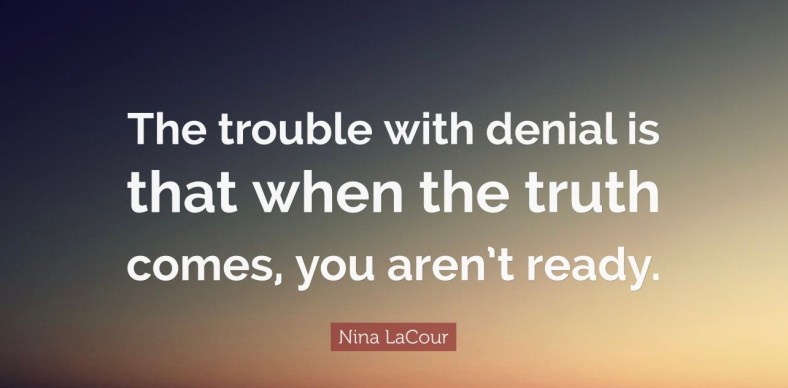
I think it was Mark Twain who said, “denial ain’t just a river in Egypt.” Denial is a big deal and it stunts people’s opportunity for success. Dealing with people in denial can be challenging. Especially when they are resistant to accepting facts or acknowledging a problem. Whether you’re trying to help someone with a personal issue or discussing a broader topic, like a political issue, here are some strategies to engage with individuals in denial:
• Stay Calm and Patient: Remain composed and patient when dealing with someone in denial. Getting frustrated or angry can escalate the situation and make the person even more defensive.
• Listen: Begin by listening to their perspective without judgment. Show empathy and understanding, even if you disagree with their viewpoint. This can help establish trust and open the door for productive conversation.
• Ask Open-Ended Questions: Encourage the person to elaborate on their thoughts and feelings. Open-ended questions can prompt them to think more deeply about their beliefs and consider alternative viewpoints. Remember, you can actually learn more from people who think differently than you than you can from people with similar beliefs.
• Provide Evidence: Present facts, evidence, and data that support your point of view. Avoid making emotional arguments or relying solely on your own opinions. Use credible sources to back up your claims.
• Respect Their Autonomy: Remember that you cannot force someone to change their beliefs or accept a reality they are denying. Respect their right to hold their own opinions, even if you strongly disagree.
• Find Common Ground: Identify shared values or goals that you both care about. Highlighting common ground can help bridge the gap between differing perspectives. It creates a basis for compromise or cooperation.
• Avoid Confrontation: Try to avoid confrontational language or behaviors that may make the person feel attacked or defensive. Use “I” statements to express your perspective rather than “you” statements that may sound accusatory.
• Offer Support: Let the person know that you are there to support them, regardless of their beliefs. This can make them more open to considering other viewpoints.
• Use Storytelling: Share personal stories or anecdotes that relate to the topic at hand. Sometimes, stories can resonate with people on a deeper level and help them see things from a different perspective.
• Give Them Time: Change often takes time, and people may need space to process new information or ideas. Be patient and allow them the time to come to their own conclusions.
• Seek Professional Help if Necessary: If the person’s denial is causing harm to themselves or others, or if it’s related to a serious issue like mental health, consider involving a professional, such as a therapist, who can provide expert guidance.
• Know When to Disengage: In some cases, despite your best efforts, you may not be able to reach an agreement or change the person’s perspective. It’s important to recognize when further engagement is unproductive and disengage respectfully if needed.
It’s also worth asking yourself if it’s possible you could be wrong. Is it possible you’re the one in denial. People in denial seldom see that reality so maybe ask a mentor or a close friend if they see you in the river of denial.
Dealing with people in denial can be challenging. By approaching the situation with empathy, patience, and a focus on constructive dialogue, you increase the chances of understanding over time.
Want more of LeadToday? I’ve changed things up on my Twitter feed for subscribers. I recently began publishing two or three videos each week focusing on an element of Authentic Leadership. I’ll post these videos each Tuesday and Thursday morning. Sometimes a bonus video pops up at other times during the week. They will be about 10 minutes long so we can get into the topic in a more meaningful way. The investment for subscribers in still only $4.99 a month. That’s for at least 80 MINUTES of quality video content on leadership a month.
If you’re interested in taking a look, head on over to my Twitter profile page. If you’re not a follower yet just hit the follow button. It will change to a subscribe button and once you hit that you’re on your way. You can cancel at any time you’ve decided you have nothing left to learn about leading the people who you count on for your success.
Here’s the link to my Twitter… https://twitter.com/leadtoday
Thank you for sharing these valuable strategies on dealing with people in denial. This is such an important topic, and your insights are spot on. Staying calm and patient, listening without judgment, and offering evidence-based arguments are indeed effective ways to foster productive conversation. Finding common ground and respecting differing opinions is also a great reminder of being understanding. ✨
Thank you, I’m glad you found the post to be useful.
https://www.yahoo.com/entertainment/good-men-25th-flashback-rob-reiner-shares-true-story-behind-jack-nicholsons-cant-handle-truth-moment-171511099.html